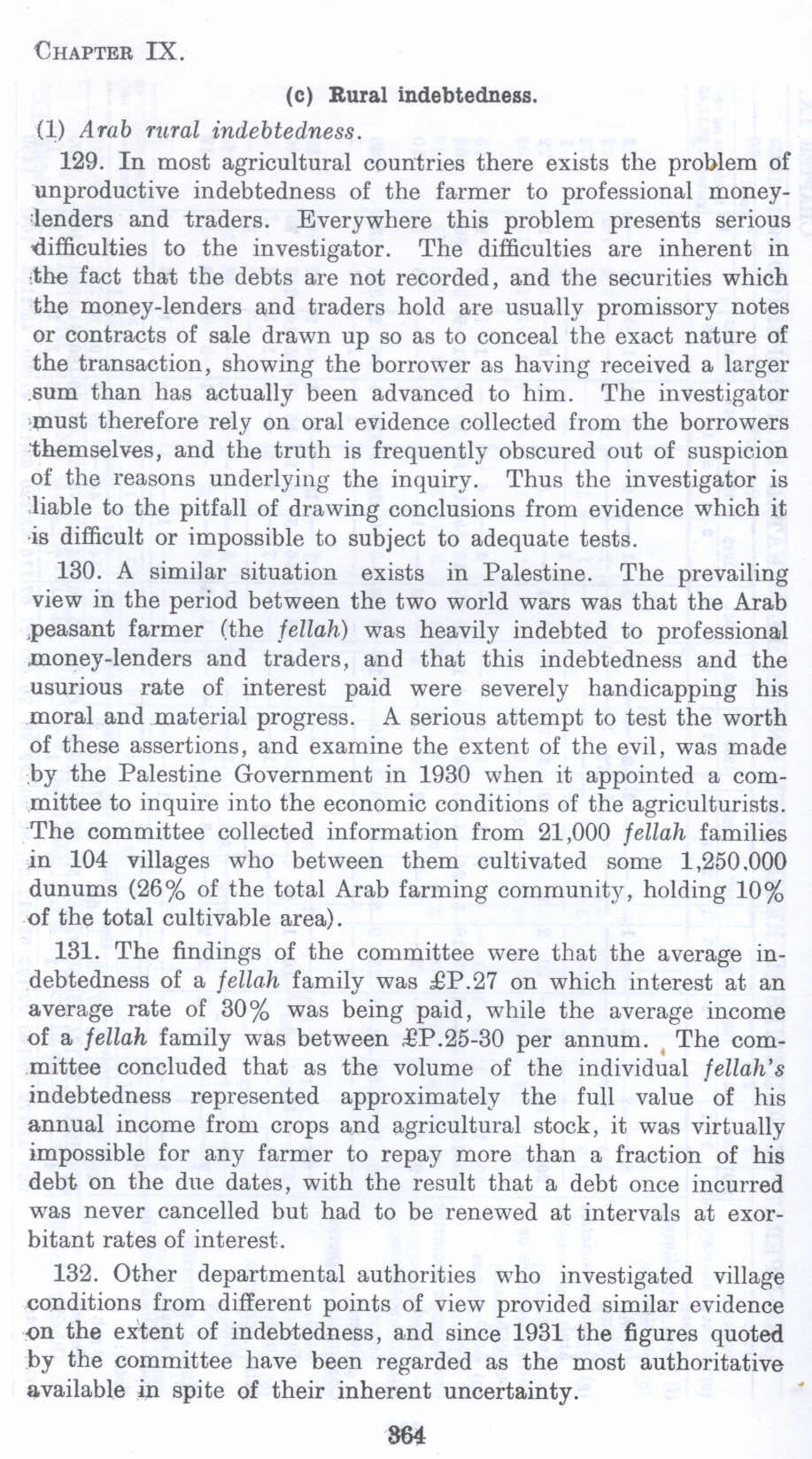| Prev | Next |  |
| Prev | Next |
| PalestineRemembered | About Us | Oral History | العربية | |
| Pictures | Zionist FAQs | Haavara | Maps | |
| Search |
| Camps |
| Districts |
| Acre |
| Baysan |
| Beersheba |
| Bethlehem |
| Gaza |
| Haifa |
| Hebron |
| Jaffa |
| Jericho |
| Jerusalem |
| Jinin |
| Nablus |
| Nazareth |
| Ramallah |
| al-Ramla |
| Safad |
| Tiberias |
| Tulkarm |
| Donate |
| Contact |
| Profile |
| Videos |
Rural (falalah) indebtedness in Palestine before 1948 (Nakba), British Mandate: A Survey of Palestine: Volume I - Page 364. Chapter IX: Agriculture: Section 5: Agricultural Credit and Co-operative Societies: (c) |
Disclaimer
The above documents, article, interviews, movies, podcasts, or stories reflects solely the research and opinions of its authors. PalestineRemembered.com makes its best effort to validate its contents.


Post Your Comment
*It should be NOTED that your email address won't be shared, and all communications between members will be routed via the website's mail server.
(c) Rural indebtedness. (1) Arab rural indebtedness.
129. In most agricultural countries there exists the problem of unproductive indebtedness of the farmer to professional money lenders and traders. Everywhere this problem presents serious difficulties to the investigator. The difficulties are inherent in -the fact that the debts are not recorded, and the securities which the money-lenders and traders hold are usually promissory notes or contracts of sale drawn up so as to conceal the exact nature of the transaction, showing the borrower as having received a larger sum than has actually been advanced to him. The investigator must therefore rely on oral evidence collected from the borrowers themselves, and the truth is frequently obscured out of suspicion of the reasons underlying the inquiry. Thus the investigator is liable to the pitfall of drawing conclusions from evidence which it -is difficult or impossible to subject to adequate tests.
130. A similar situation exists in Palestine. The prevailing view in the period between the two world wars was that the Arab .peasant farmer (the fellah) was heavily indebted to professional money-lenders and traders, and that this indebtedness and the usurious rate of interest paid were severely handicapping his moral and .material progress. A serious attempt to test the worth of these assertions, and examine the extent of the evil, was made .by the Palestine Government in 1930 when it appointed a committee to inquire into the economic conditions of the agriculturists. The committee collected information from 21,000 fellah families .in 104 villages who between them cultivated some 1,250.000 dunums (26% of the total Arab farming community, holding 10% of the total cultivable area).
131. The findings of the committee were that the average indebtedness of a fellah family was £P.27 on which interest at an average rate of 30% was being paid, while the average income of a fellah family was between £P.25-30 per annum. , The committee concluded that as the volume of the individual fellah's indebtedness represented approximately the full value of his annual income from crops and agricultural stock, it was virtually impossible for any farmer to repay more than a fraction of his debt on the due dates, with the result that a debt once incurred was never cancelled but had to be renewed at intervals at exorbitant rates of interest.
132. Other departmental authorities who investigated village conditions from different points of view provided similar evidence on the extent of indebtedness' and since 1931 the figures quoted by the committee have been regarded as the most authoritative available in spite of their inherent uncertainty.
Page 364